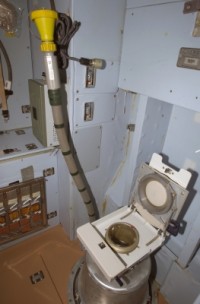By Hamish Johnston
The physics of how the contents of a microwaved pastry can become “hotter than the Sun” is the subject of an entertaining and informative blog entry by Ethan Siegel. He looks at the physics of heating “microwave pockets”, those roof-of-your-mouth-scalding savoury treats that appeared on shelves in the 1980s. He explains why the outer portion of a pocket can be extremely hot, while the interior remains frozen – and why pockets often explode when heated through.
Siegel’s been a bit cheeky and republished this entry from 2009, but I suppose it’s timeless and I’m sure you can still buy microwave pockets somewhere! His blog is called Starts With a Bang and the entry is entitled “Throwback Thursday: The physics of hot pockets”.
As the crisis in the Ukraine drags on, scientists are beginning to worry about the effect it could have on scientific collaborations involving Russia and the West. Several websites are reporting that Russia is threatening to ban US astronauts from the shuttles that travel to the International Space Station (ISS). Indeed, the Independent quotes Russia’s deputy prime minister Dmitry Rogozin as saying that it would be possible for Russia to independently operate its portion of the ISS, while the US would not be able to do so. Indeed both toilets on the ISS are Russian, so it could get very messy up there!
Last week the British planetary scientist Colin Pillinger passed away just two days short of his 71st birthday. Pillinger is famous in the UK for his failed attempt at landing the Beagle 2 probe on Mars in 2003. Originally conceived as a low-cost private mission to the Red Planet, Beagle 2 eventually cost the British taxpayer one third of the mission’s £66 million price tag. This is much cheaper than NASA’s missions to Mars, but as Dwayne Day points out in an article in the Space Review “[NASA’s missions] had the added benefit that they actually worked.”
In “Red Planet dreams”, Day takes a critical look at Pillinger’s role in Beagle 2 as well as the fall-out from the mission’s failure. Indeed, he suggests that at least one planetary scientist was pleased that Beagle 2 failed because success could have resulted in drastic budget cuts for NASA’s Mars missions.
In the UK, Pillinger is celebrated as a lovable and eccentric everyman (a role he played to a tee with his unkempt hair, wild grin and West Country accent), who challenged NASA’s way of doing things. Despite identifying Pillinger’s shortcomings, Day can’t help admiring the man: “Perhaps his legacy is that somewhere he lit a fire in an eccentric young person’s mind, making them believe that someday they too could start their own mission to Mars.”

There appears to be no limit to how hot something can become. But there is a limit on how cold it can get.
http://mysteriousworldjlc.blogspot.com/